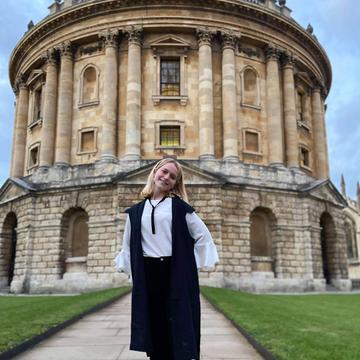Flora Blissett

HAPP Scholarship (History and Philosophy of Physics)
Joining us from: Salisbury, UK
MSc History of Science, Medicine and Technology (2020)
Hello, I've been asked to write a bio. Unfortunately, I am quite a normal person, and only 21, so there isn't much material yet. I grew up in a village with two older brothers and parents. The oldest brother is finishing his History PhD, and the middle brother is an artist. When I run out of things to say about myself, I start telling people about his paintings. Growing up, I attended the local school, situated in a beautifully historic market-town renowned for its 123 meter-tall cathedral spire and Neolithic stone circles. Needless to say, my youth was wild. This is demonstrated by my interests: I love dogs and pigs but don’t have any. I enjoy reading and I also enjoy playing outside. I might be funny, or I might just have rather kind friends. I’m not as organized as I would like to be. My family sometimes like things I cook, and sometimes ban a second attempt at recipes. When I “grow up” I would like to work in a museum. I chose to do English Literature and Language at undergraduate because I liked Virginia Woolf and Keats; I applied for this History of Science masters because I like questioning structures which we have come to take for granted (some people call these annoying questions, but I think they are important). My brother's paintings are really good, you should check them out.
In a recent Zoom call, a tutor asked me how I was finding the course. In response, I said “I’m having the best time! – I know nothing about anything, so I’m interested by everything!” He looked worried and said that he hoped I know something by the end of the course. But despite his furrowed brow I think it is an important, comforting, and exciting thing to remember: there is always more to know and think about. Coming from an undergraduate course in English, this holds especially true for me. During my three years of reading, my already existing curiosity in history and in science was cultivated, and combined: I put Hooke’s Micrographia under the lens of language theory; I related Milton’s epic similes to Newton/ Leibniz’s infinitesimal calculus; I contemplated Thomas Hardy’s engagement with astronomy. This interdisciplinary approach also reflects my overarching interest: the different ways of seeing the world.
And when I'm not diligently "thinking about things", I dabble in activities, never quite perfecting any, but thoroughly enjoying them all. Oxford’s museums are some of the best things in this city. I regularly visit the Ashmolean – I’ve even become a volunteer there. I’ve also been attending online Italian classes provided through the university. For fresh air and exercise, I go for runs with friends along the web of river paths; I've signed up to cox the St Cross/Wolfson’s men's boat; and I've joined the postgrad college women’s football team, The Foxes, as well as the University Development Squad for women’s football. In the summer, I look forward to embarrassing myself on a tennis court, and attending lazy afternoons on a cricket pitch solely for the match-tea and knitted vests.
This HAPP scholarship has been hugely beneficial on both a personal and a financial level. I was truly surprised to be given it; surprised, and inspired. It gave me such reassurance that maybe, just maybe, I am able to do this masters. The scholarship has also made me more aware of other aspects of my MSc which aren't explicitly treated in course content (namely, the philosophy of science, as opposed to just the history). It has thus given me the chance to engage with ideas to which I would otherwise be ignorant. Additionally, it has been a great financial help, without which I would not have been able to attend this course.





